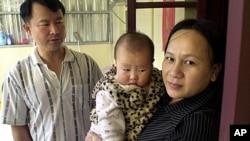A legislator’s comments in Taiwan have touched off a public furor over one of the island’s stickiest social issues. Increasingly, Taiwanese men are choosing wives from overseas, and some say that is leaving growing numbers of local women without husbands.
Stepping outside of tradition
Opposition legislator Chang Show-foong, a former writer, sparked the controversy by complaining that more and more local men are taking wives from Taiwan's poorer neighbors. Statistics show about 427,000 Taiwanese men have married foreign wives, mainly from China and Southeast Asia. Meanwhile, up to one-third of Taiwanese women over the age of 30 are unmarried, according to some estimates.
Chang said during a debate on policies for new immigrants that men often prefer the women from overseas. She said the trend of seeking wives from outside Taiwan has caused "tremendous losses to the nation" and suggested that the government offer a subsidy to the island’s unmarried women.
Chang is telling a parliamentary meeting that whenever a foreign bride comes in, a Taiwanese woman is being passed over. There are only so many men on the island, she argues, so Taiwan is left with many women who may never marry.
Controversy
A long list of social organizations and other political figures quickly sounded off against the legislator, who is backed by a minor party. The larger Democratic Progressive Party took offense at the description of unwed women as leftovers and the idea that foreign wives cannot fit in. Local media argued that the government should not seek to regulate marriages to foreigners.
A group of foreign wives protested in Taipei on Friday to defend their qualifications as spouses. At the same time, Taiwanese women demonstrated to demand that lawmakers stay out of their decisions to marry or stay single.
Controversial remarks by Taiwan legislators are nothing new, but the latest outcry shows that Chang touched on a sensitive issue.
Motivation
Linda Arrigo, a sociology instructor at Taipei Medical University, says Taiwan's increasingly well-educated women are often entering professional careers and earning large salaries that make them want to be accepted as equals by men.
Arrigo says that is unacceptable to some tradition-minded men, many of whom are encouraged in their views by conservative mothers. So they are turning instead to poorer, less educated women from Southeast Asia.
Many of the men who look abroad for wives are from the lower economic classes themselves, making them less appealing to upwardly-mobile Taiwanese women.
The problem is not unique to Taiwan. Women in South Korea and the wealthier cities in China face the same situation as their economies improve and lead them to professional careers, while local men cling to traditional ideas about gender roles.
Chang has expressed surprise about the outrage she sparked. She says she only wanted to call on men to see Taiwanese women as skillful, healthy and able to weather hardships.




